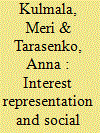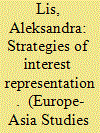| Srl | Item |
| 1 |
ID:
096033


|
|
|
| 2 |
ID:
143807


|
|
|
|
|
| Summary/Abstract |
The essay investigates how Russian veterans’ organisations represent the concerns of their constituency vis-à-vis the Russian state. An interest group approach is applied to investigate the ‘brokering’ function exercised by veterans’ organisations to lobby on behalf of their constituency. The analysis is based on the study of selected veterans’ organisations in Karelia and St Petersburg. The research finds that veterans’ organisations operate in a restricted environment, though our analysis shows that their agency has mattered, largely due to their political connections. The investigation reveals those mechanisms through which Russian veterans’ organisations act as brokers.
|
|
|
|
|
|
|
|
|
|
|
|
|
|
|
|
| 3 |
ID:
139586


|
|
|
|
|
| Summary/Abstract |
Social legitimacy is central to the effectiveness of international organisations (IOs). Yet, so far, we have little systematic knowledge about what drives citizens to support or oppose IOs. In this article, we isolate and assess three alternative explanations of social legitimacy in global governance, privileging interest representation, institutional performance, and confidence extrapolation. We test these theories in a multilevel analysis of citizen confidence in the United Nations (UN) using World Values Survey and European Values Study data, supplemented by contextual measures. The results grant support to the arguments that institutional performance and confidence extrapolation shape popular confidence in the UN, while offering little support for the explanation of interest representation. These findings challenge the predominant understanding that more democratic procedures lead to greater social legitimacy for IOs. Instead, the UN case suggests that the social legitimacy of IOs is based primarily on the organisations' capacity to deliver, as well as on citizens' general confidence in political institutions, which IOs may have little to do with and can do little to change.
|
|
|
|
|
|
|
|
|
|
|
|
|
|
|
|
| 4 |
ID:
128992


|
|
|
|
|
| Publication |
2014.
|
| Summary/Abstract |
Poland's European Union accession afforded Polish trade unions membership of European-wide, umbrella trade union organisations. This essay evaluates the strategies Polish trade unions adopted to represent their interests following Poland's accession to the European Union. It draws on a series of interviews and document analysis. In addition the essay seeks to gauge the extent to which Polish trade unions were 'Europeanised', understood in both the context of their adoption of European policy models and their ability to win support for their causes at the European level.
|
|
|
|
|
|
|
|
|
|
|
|
|
|
|
|